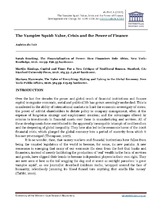| dc.description.abstract | Over the last five decades the power and global reach of financial institutions and finance capital to organize economic, social and political life has grown seemingly unchecked. This is manifested in the ability of international markets to limit the economic sovereignty of states; the power of activist shareholders to dictate policy to company management, often at the expense of long‐term strategy and employment creation; and the advantages offered by returns to investments in financial assets over those in manufacturing and services. All of these developments have contributed to the apparently inescapable triumph of neoliberalism and the deepening of global inequality. They have also led to the economic havoc of the 2008 financial crisis, which plunged the global economy into a period of austerity from which it has not yet emerged (Thompson, 2017).
It is no wonder, then, that money markets and financial institutions have fallen from being the vaunted legislators of the world to become, for some, its new pariahs. A new consensus is emerging that many of our economic ills stem from the fact that banks and financiers, instead of merely facilitating the production of ‘real’ wealth in the form of services and goods, have slipped their bonds to become independent players in their own right. They are now seen at best as the tail wagging the dog and at worst as outright parasites: ‘a great vampire squid’, as one journalist described Goldman Sachs, ‘wrapped around the face of humanity, relentlessly jamming its blood funnel into anything that smells like money’ (Taibbi, 2010). | en_US |

